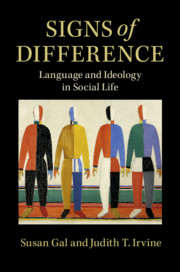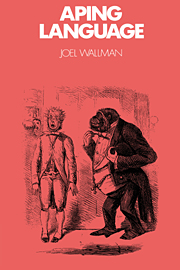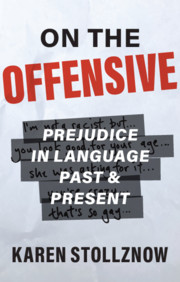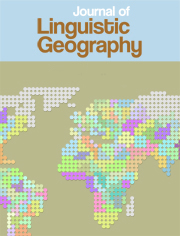Signs of Difference
How are peoples' ideas about languages, ways of speaking and expressive styles shaped by their social positions and values? How is difference, in language and in social life, made - and unmade? How and why are some differences persuasive as the basis for action, while other differences are ignored or erased? Written by two recognised authorities on language and culture, this book argues that ideological work of all kinds is fundamentally communicative, and that social positions, projects and historical moments influence, and are influenced by, people's ideas about communicative practices. Neither true nor false, ideologies are positioned and partial visions of the world, relying on comparison and perspective; they exploit differences in expressive features - linguistic and otherwise - to construct convincing stereotypes of people, spaces and activities. Using detailed ethnographic, historical and contemporary examples, this outstanding book shows readers how to analyse ideological work semiotically.
- Presents a step-by-step explanation of semiotic processes, using concrete examples, showing how sign relations constitute ideology
- Draws on fieldwork and historical materials, enabling researchers to engage in ideological analysis and critique by demonstrating its methods
- Provides a deep semiotic analysis of 'perspective' and 'comparison', fundamental processes of social and linguistic differentiation that motivate historical change
Reviews & endorsements
‘Systematically mapping out new theoretical and empirical ground, this field-defining book richly develops the promise of Susan Gal and Judith T. Irvine's influential approach to understanding ideologies of linguistic and social difference. In crystal-clear analyses of ethnographic and historical material from Africa, Central Europe, and the United States, they make accessible the interlocking semiotic processes through which ordinary folks and experts alike create consequential contrasts between kinds of people. This landmark study will be essential reading for scholars of social relations well beyond the borders of linguistic anthropology.' Kathryn A. Woolard, University of California, San Diego
'Gal (Univ. of Chicago) and Irvine (Univ. of Michigan, Ann Arbor) gather in this volume an eclectic assortment of oral and literary texts to which they apply a semiotic analysis … Recommended.' L. Lindstrom, Choice
‘The book is readable and very well written, using vivid language with striking examples, metaphors and metonymies to illustrate and emphasize stances and angles. This makes Gal’s and Irvine’s volume not only important to academics and faculty of various linguistic subdisciplines, but also worthwhile for graduate and PhD students.’ Katharina Klara Tyran, LINGUIST List
‘… the book walks the reader through the semiotic experience of everyday life, making it possible to see meaning-making as it happens, a quality that makes it particularly valuable for students.’ Cambridge University Press
Product details
August 2019Paperback
9781108741293
326 pages
228 × 153 × 20 mm
0.49kg
3 b/w illus. 8 tables
Available
Table of Contents
- Prologue: questions and exhibits
- Acknowledgements
- Introduction
- Part I. Ethnography:
- 1. Wolof in Senegal
- 2. German-Hungarians in Hungary
- Part II. Semiotics:
- 3. Ingredients: signs, conjectures, perspectives
- 4. Comparison: the semiotics of differentiation
- 5. Dynamics of change in differentiation
- Part III. Sites:
- 6. Situating ideological work
- 7. Among and between sites
- 8. Scales and scale-making: connecting sites
- Part IV. Pasts:
- 9. Library to field: ideologies in nineteenth-century linguistic research
- Coda: avenues of inquiry.







